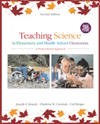| archival data | Data that scientists collected in the past and then stored for future use.
|
 |
 |
 |
| benchmark lessons | Lessons that teach a necessary concept or skill.
|
 |
 |
 |
| cause and effect questions | Questions that provide opportunities for students to make inferences about how one variable affects another variable.
|
 |
 |
 |
| conceptual models | Models that link the unfamiliar to the familiar by using metaphors and analogies.
|
 |
 |
 |
| continuous data | Data when the intervals between the data have meaning.
|
 |
 |
 |
| control variables | Variables that are held constant during an investigation.
|
 |
 |
 |
| current data | Data collected in the recent past.
|
 |
 |
 |
| dependent variable | Variable that changes as the result of the conditions of the investigation or the "it changed" variable.
|
 |
 |
 |
| descriptive questions | Questions that focus on finding out about the observable characteristics of phenomena.
|
 |
 |
 |
| descriptive statistics | Statistics such as differences, averages, and ranges that help a student make sense of data.
|
 |
 |
 |
| designing | How a student will structure an experiment in order to find an answer to his/her question.
|
 |
 |
 |
| discrete data | Data that can be divided into categories and when the intervals between the data have no meaning.
|
 |
 |
 |
| feedback | Instructional help and information given to a student by teachers or other students for the purpose of improving one's academic work.
|
 |
 |
 |
| hypermedia | Media that has links to other documents or that has links to other parts of the same document.
|
 |
 |
 |
| hypotheses | Questions stated in testable form that specify how the independent variable will influence the dependent variable.
|
 |
 |
 |
| independent variable | Variable that is purposefully changed by the investigator or the "you changed it" variable.
|
 |
 |
 |
| inferences | Conclusions drawn from evidences or reasoning.
|
 |
 |
 |
| initial observations | Introductory observations that students make of phenomena that might acquaint them with concepts, pique their curiosity, and motivate them to ask questions.
|
 |
 |
 |
| inquiry-based learning | Learning that focuses on developing a deep understanding of science concepts and principles by systematically exploring the world.
|
 |
 |
 |
| investigation web | A process of carrying out an investigation that includes "messing about," asking and refining questions, finding information, planning and designing, building the apparatus and collecting data, analyzing data, making conclusions, and communicating findings.
|
 |
 |
 |
| manipulation of materials | Involving students in building apparatus, taking things apart, or handling or playing with objects.
|
 |
 |
 |
| mathematical models | Models that specify a relationship between the variables described and the behavior of phenomena.
|
 |
 |
 |
| messing about | A way of initially engage students in exploring, manipulating materials, making initial observations, reading about phenomena, and taking things apart.
|
 |
 |
 |
| model | A simplified representation of a phenomenon that suggests how the phenomenon works.
|
 |
 |
 |
| nonlinear | A process that does not happen in a step-by-step, straight-line pattern .
|
 |
 |
 |
| operational definition | A definition of a variable in terms of how the variable will be manipulated, measured, or observed.
|
 |
 |
 |
| physical models | Devices or processes that behave like the phenomena.
|
 |
 |
 |
| planning | The process of students thinking about and working out how their investigation will take place, what equipment is needed, and what data do they need to collect.
|
 |
 |
 |
| predictions | A statement of what a student thinks will happen in an investigation .
|
 |
 |
 |
| qualitative observations | Detailed descriptions of what is seen.
|
 |
 |
 |
| quantitative observations | Descriptions that can be counted or recorded in a numerical format.
|
 |
 |
 |
| quicktrial | Experimental technique in which students try out experimental procedures to see if they work.
|
 |
 |
 |
| relational questions | Questions that allow students to find out about associations between the characteristics of different phenomena.
|
 |
 |
 |
| seeking information | Finding background information essential to an investigation.
|
 |
 |
 |
| sharing | Communicating to others your ideas, plans, and progress throughout the investigation, your findings, and your final products.
|
 |
 |
 |
| validity | Fair and accurate generalizations.
|
 |
 |
 |
| variables | The characteristics that will change in an investigation.
|



 2003 McGraw-Hill Higher Education
2003 McGraw-Hill Higher Education